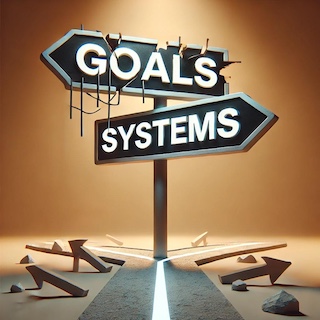Your 2025 Goals Won’t Matter Without This
As the new year approaches, business leaders are in full planning mode, setting ambitious goals for 2025. More revenue. More profit. Faster growth. Bigger market share. Every company, like every individual, needs goals to create focus and direction. Goals define the desired outcome the target you want to hit.
But here’s the uncomfortable truth: Goals alone don’t drive results.
The difference between the companies that achieve their targets and those that fall short isn’t the goals themselves. It’s the systems they follow daily, the collection of habits, processes, and rhythms that shape execution. Systems, not goals, determine long-term success.
Goals vs. Systems: The Hidden Gap
Most companies set goals like:
- Exceed revenue targets
- Become the best in their industry
- Improve profitability
- Speed time to liquidity
But they spend far less time defining how they’ll actually get there.
Think about it this way: If your company has consistently missed its goals, the problem isn’t the target it’s the system guiding your daily execution. Your business is already running on an operating system, whether you realize it or not. It may be well-structured, or it may be disjointed patched together with duct tape and unwritten rules like “go ask Joe.”
Whatever system you’ve been running has been perfectly designed to produce your current results. If you want different results in 2025, you need to fix the system, not just set bigger goals.
Why Systems Always Win
Goals help you win once. Systems help you win repeatedly.
Imagine a professional athlete setting a goal to win a championship but never following a disciplined training regimen. Or a company aiming for record revenue but lacking clear processes, accountability, or rhythm. Success is never just about the goal, it’s about the daily actions that support it.
A Case Study in Change
I recently worked with a company that had missed its revenue targets for the past two years. They called me in to help with their 2025 planning session. Like many, they spent most of their time talking about what they wanted to achieve, but very little on how they would get there.
So, we changed the conversation.
Instead of just setting targets, we defined their operating system, the mechanisms that would drive execution. We focused on:
- People – Ensuring the right team members were in the right roles
- Processes – Establishing clear, repeatable playbooks
- Structure – Aligning leadership and accountability
- Success Metrics – Defining how progress would be tracked
- Company Rhythm – Creating a cadence for execution and decision-making
I can’t predict their exact 2025 results, but based on what I’ve seen with other companies, they are positioned for a record growth year, not because they set better goals, but because they built a better system.
The 2025 Planning Mistake You Can’t Afford to Make
As you finalize your 2025 plans, ask yourself:
- Are we spending more time setting goals than designing systems?
- Do we have a defined rhythm for execution?
- Are our people, processes, and structure aligned for success?
If your system isn’t built to support your goals, you’ll end up in the same place next year frustrated, missing targets, and wondering what went wrong.
So yes, set your goals for 2025. But spend even more time defining the systems that will get you there. Because in the end, it’s not about what you want to achieve it’s about how you’ll make it happen.
And that’s where real business transformation begins.







